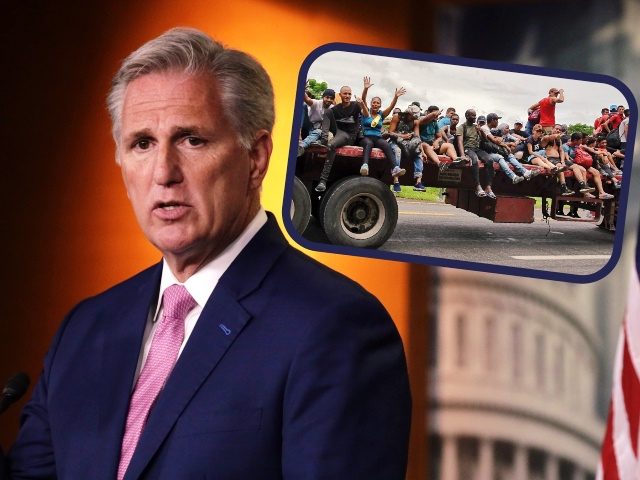Rep. Kevin McCarthy has announced the House GOP’s migration policy campaign promises for 2023, saying it would pass legislation to bar the employment of illegal migrants.
McCarthy’s “Commitment to America” is useful for voters before the election. But the written promises will also help GOP supporters and legislators overcome likely bipartisan opposition to reform policies if the GOP gains majority control of the House in November. And those promises also provide a platform for a wider range of migration reforms that can shift wealth and political power to ordinary Americans.
The campaign promise was applauded by the Federation for American Immigration Reform (FAIR):
FAIR has been proud to stand with the strongest-ever assembled coalition of public interest groups and former immigration officials in calling for legislation right out the gate to end a border crisis deliberately instigated by the Biden administration. We thank Republican leaders for listening to our expertise and insight, and stand ready to work with them on turning the immigration component of the Commitment to America into legislative text.
Democrats have an open borders agenda, Republicans now have a secure borders agenda. It’s time for the American people to decide.
The document includes a chapter titled “A Nation That’s Safe.”
In turn, that chapter includes a section titled “Secure the Border and Combat Illegal Immigration,” which says:
Record illegal border crossings under this Administration have led to more drugs, more crime, and a demoralized Border Patrol who are hamstrung from carrying out their law enforcement mission. The situation at the border has become both a national security and humanitarian crisis and must be addressed immediately.
The section includes a link marked “Show our plan to regain control of the southern border,” which promises to:
Fully fund effective border enforcement strategies, infrastructure, and advanced technology to prevent illegal crossings and trafficking by cartels
End catch-and-release loopholes
Require proof of legal status to get a job
Eliminate welfare incentives
The items on the agenda would sharply narrow the legal loopholes that have been used by President Joe Biden’s deputies to invite and reward at least three million illegal economic migrants into the United States since January 2021.
The vast southern inflow adds to the normal annual economic inflow of about two million assorted legal migrants, visa workers, illegals who take jobs after arriving as tourists, and migrants who overstay their visas.
In 2022, these huge inflows may bring in almost one migrant for every American who turns 18 — or one migrant for every American who is born — this year.
This replacement-scale migration has an enormous economic impact that is resolutely ignored by the establishment media.
Biden’s legal and illegal migration is unfairly skewing the economy in favor of investors by pressuring down Americans’ wages.
It is also boosting rents and housing prices, and pushing up inflation for a wide variety of goods, such as used autos and baby food. For example, economists say housing costs comprise one-third of inflation — and those higher housing costs are being spiked by roughly five million legal and illegal migrants since 2021.
Many business groups and donors rationally support this federal Extraction Migration policy, which provides them with an imported stimulus of cheap workers, government-aided consumers, and high-occupancy renters.
This policy also minimizes marketplace pressure on coastal investors to invest in heartland states, including Sen. Mitch McConnell’s state of Kentucky. For example, the coastal investors in New York and California who might be pressured in a growing economy to hire employees in distant Kentucky, Nebraska, Ohio, and other heartland states, can instead hire busloads of grateful, reliable, and cheap workers at downtown bus stations each day.
Interestingly, the McCarthy plan also mentions the huge death toll of Biden’s migration. That may encourage Republicans to shame Democrats for the growing death toll of Biden’s migration — just as Democrats tried to stigmatize Republicans in 2018 and 2020 with the poll-tested theme of “child separations.”
McCarthy’s border agenda is partly based on the consensus plan developed by a wide range of immigration reform groups. In May, the consensus plan was presented to McCarthy and other GOP leaders, including Rep. Jim Jordan (R-OH) and Rep. Jim Banks (R-IN).
The consensus plan has been boiled down into a broader plan released in July. The plan, titled, “House Republicans: We Must Secure the Southern Border,” includes a long list of important commitments for the House Judiciary Committee.
The House’s committee on homeland defense has played a minor role in shaping border policy, partly because GOP leaders have allowed a pro-migration Republican from New York to chair the committee. The chairman, Rep. John Katko, for example, recently announced he would help border security by cutting grass:
Clear the Carrizo Cane and Salt Cedar. These invasive species along the Rio Grande River impede CBP’s activities along the border. The non-native plant is also an obstacle for first responders and should be eradicated.
Katko has announced his retirement, which was forced by the arrival of many poor, government-dependent migrants into New York state’s high-migration/high-cost economy.
McCarthy’s border-focused agenda is markedly different from the evasive, non-committal statements offered on September 20 by McConnell.
“Orderly legal immigration is part of what makes America strong: Anarchy and open borders make us weak,” McConnell said, adding: “well-to-do blue enclaves are finally witnessing the smallest fraction of the challenges that open borders have forced on working-class communities all across our country.”
McConnell did not explain how migration imposes different pressures on “well-to-do blue enclaves” and “working-class communities.”
But he did emphasize the pocketbook damage of inflation. “In Clifton, Colorado, the director of one local food bank reports that she had served 1,000 more families in the first half of this year than the first half of last year,” McConnell said, adding a quote from the director: “They cannot short their rent bill, but they can short their grocery bill … they come here so [charity] can fill the gap.”

COMMENTS
Please let us know if you're having issues with commenting.